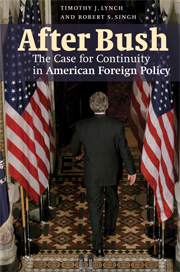That's the name of a book by two British scholars that is being published this spring by Cambridge University Press. See the argument below.
:puke:
(Sorry. I caught something. You may catch it too.)
Incidentally, I believe they are right that Bushism will be placed in the mainstream of American foreign policy. I believe they are dead wrong if they're arguing that it should be.
http://americas.sas.ac.uk/newsletter/index.htmAfter Bush: The Case for Continuity in American Foreign Policy by Tim Lynch and Rob Singh
In Spring 2008, Cambridge University Press will publish After Bush: The Case for Continuity in American Foreign Policy. Its co-authors, Rob Singh (Birkbeck) and Tim Lynch, concluded the manuscript over the summer. As George W. Bush approaches the end of his second term, his foreign policy appears to have won few admirers. Pundits and politicians eagerly bash the tenets of the Bush Doctrine. Rob and Tim have attempted to avoid the heated debate over Bush the Texan, and argue that his strategy is really not that unusual. Indeed, they argue that it fits within the mainstream of the American foreign policy tradition. Though the shifting tide of public opinion has led many to anticipate that his successor will repudiate the actions of the past eight years they predict continuity in US foreign policy between his presidency and those that will follow. Rob and Tim have tried to offer a more balanced audit of the war on terror and argue that the Bush Doctrine has been consistent with past foreign policies-from Republican and Democratic presidencies-and that the key elements of Bush's grand strategy will likely continue to shape America's approach in the future. Above all, they suggest that his successors, whomever they might be, will pursue 'Bush's war' with similar dedication.
The authors' modest hope is that the After Bush will establish itself as one of the first scholarly attempts to place recent foreign policy into a broader historical perspective. They have tried to write an account that avoids the partisan and ideological rancour which marks too much of the debate about the current president. What foreign policy might look like after him - rather than the weighing of arguments for and against the 43rd president - is central to the book
Tim Lynch is a Lecturer in US foreign policy
